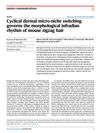 6 citations,
April 2017 in “Frontiers in Pharmacology”
6 citations,
April 2017 in “Frontiers in Pharmacology” Chinese medicine may help treat hair loss by affecting genes and enzyme activity.
 4 citations,
August 2023 in “Nature Communications”
4 citations,
August 2023 in “Nature Communications” Mouse zigzag hair bends form due to a 3-day cycle of changes in hair progenitors and their environment.
 3 citations,
May 2023 in “Frontiers in immunology”
3 citations,
May 2023 in “Frontiers in immunology” Faulty inflammasome activation may lead to autoimmune skin diseases and could be a target for new treatments.
 April 2024 in “Cell death and disease”
April 2024 in “Cell death and disease” Long COVID causes various long-term health issues and needs better awareness and treatment.
 November 2023 in “npj regenerative medicine”
November 2023 in “npj regenerative medicine” Skin spheroids with both outer and inner layers are key for regrowing skin patterns and hair.

Platelet-rich plasma is a promising and cost-effective treatment for hair and skin issues in older adults in India.

PRP is a versatile and affordable treatment for improving appearance in the elderly, with patient needs and expectations being important.

Human hair follicle cells can be turned into stem cells that may help clone hair for treating hair loss or burns.
 222 citations,
September 2016 in “JCI insight”
222 citations,
September 2016 in “JCI insight” Tofacitinib is safe and effective for severe alopecia areata, but hair loss may return 2 months after stopping treatment.
 125 citations,
August 2020 in “Frontiers in Immunology”
125 citations,
August 2020 in “Frontiers in Immunology” Men generally have more severe COVID-19 cases and higher death rates than women due to biological differences.
 83 citations,
June 2018 in “Frontiers in immunology”
83 citations,
June 2018 in “Frontiers in immunology” Certain types of T cells are essential for healthy skin and play a role in skin diseases, but more research is needed to improve treatments.
 47 citations,
March 2022 in “Frontiers in cellular and infection microbiology”
47 citations,
March 2022 in “Frontiers in cellular and infection microbiology” Changes in skin microbes play a role in some skin diseases and could lead to new treatments.
 31 citations,
March 2018 in “Frontiers in Immunology”
31 citations,
March 2018 in “Frontiers in Immunology” The document concludes that anti-dsDNA antibodies are not unique to SLE and their use as indicators is doubtful, highlighting the need for better understanding and classification of the disease.
 24 citations,
May 2021 in “Nature Communications”
24 citations,
May 2021 in “Nature Communications” Cavity macrophages gather on organ surfaces but don't really invade or help repair the organs after injury.
 22 citations,
May 2021 in “Nature Communications”
22 citations,
May 2021 in “Nature Communications” Tissue stiffness affects hair follicle regeneration, and Twist1 is a key regulator.
 20 citations,
June 2010 in “Genes and Immunity”
20 citations,
June 2010 in “Genes and Immunity” Blood tests can help understand the genetic differences in people with alopecia areata, including how severe it is and if it's inherited.
 19 citations,
December 2018 in “Experimental and Molecular Medicine”
19 citations,
December 2018 in “Experimental and Molecular Medicine” Small molecule IM boosts hair growth by changing stem cell metabolism.
 19 citations,
January 2018 in “Scientific Reports”
19 citations,
January 2018 in “Scientific Reports” Non-immune factors play a significant role in alopecia areata.
 13 citations,
April 2023 in “Nature communications”
13 citations,
April 2023 in “Nature communications” Long COVID patients have more health issues than non-infected people.
 12 citations,
August 2020 in “Frontiers in Genetics”
12 citations,
August 2020 in “Frontiers in Genetics” H19 boosts hair growth potential by activating Wnt signaling, possibly helping treat hair loss.
 8 citations,
March 2020 in “Frontiers in Cell and Developmental Biology”
8 citations,
March 2020 in “Frontiers in Cell and Developmental Biology” Researchers created immortal human skin cells with constant testosterone receptor activity to study hair loss and test treatments.
 7 citations,
December 2021 in “Curēus”
7 citations,
December 2021 in “Curēus” Breast cancer skin metastases are rare, look different, and can be confused with other skin issues, so a biopsy is needed for accurate diagnosis.
 6 citations,
May 2020 in “Scientific reports”
6 citations,
May 2020 in “Scientific reports” Researchers identified genes and proteins that may influence wool thickness in sheep.
 4 citations,
April 2021 in “Experimental and Molecular Medicine”
4 citations,
April 2021 in “Experimental and Molecular Medicine” The conclusion is that certain genetic factors and blood types may affect COVID-19 severity, but changes in ACE2 and TMPRSS2 genes are not clearly linked to it.
 2 citations,
September 2023 in “Frontiers in molecular biosciences”
2 citations,
September 2023 in “Frontiers in molecular biosciences” Inducing ferroptosis in hepatic stellate cells is crucial for treating liver fibrosis.
 April 2024 in “Cell death and differentiation”
April 2024 in “Cell death and differentiation” Cell death shapes skin stem cell environments, affecting inflammation, repair, and cancer.
 February 2024 in “Journal of dermatology research reviews & reports”
February 2024 in “Journal of dermatology research reviews & reports” A 50-year-old woman with breast cancer developed an autoimmune skin disorder, highlighting the need for thorough checks and team-based treatment.
 January 2024 in “Hypertension research”
January 2024 in “Hypertension research” More research is needed to understand sex and racial differences in long COVID.
 November 2023 in “Frontiers in pharmacology”
November 2023 in “Frontiers in pharmacology” Drug repositioning offers hope for new, affordable treatments for a genetic skin disorder called ARCI.
 September 2023 in “Frontiers in cell and developmental biology”
September 2023 in “Frontiers in cell and developmental biology” Vav2 changes how hair follicle stem cells' genes work as they age, which might improve regeneration but also raise cancer risk.






























